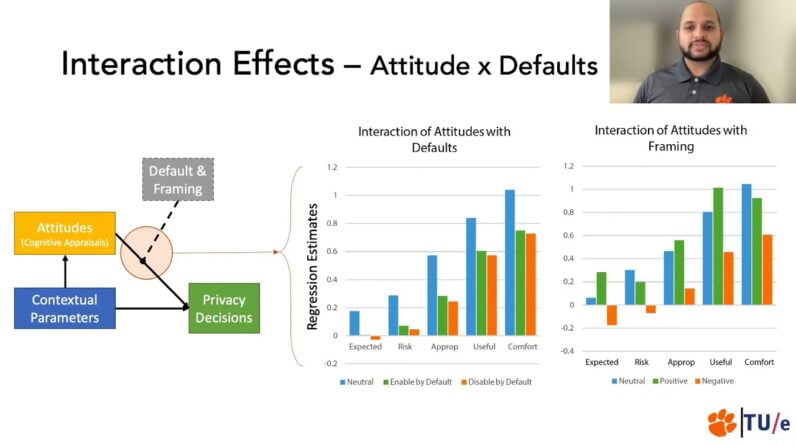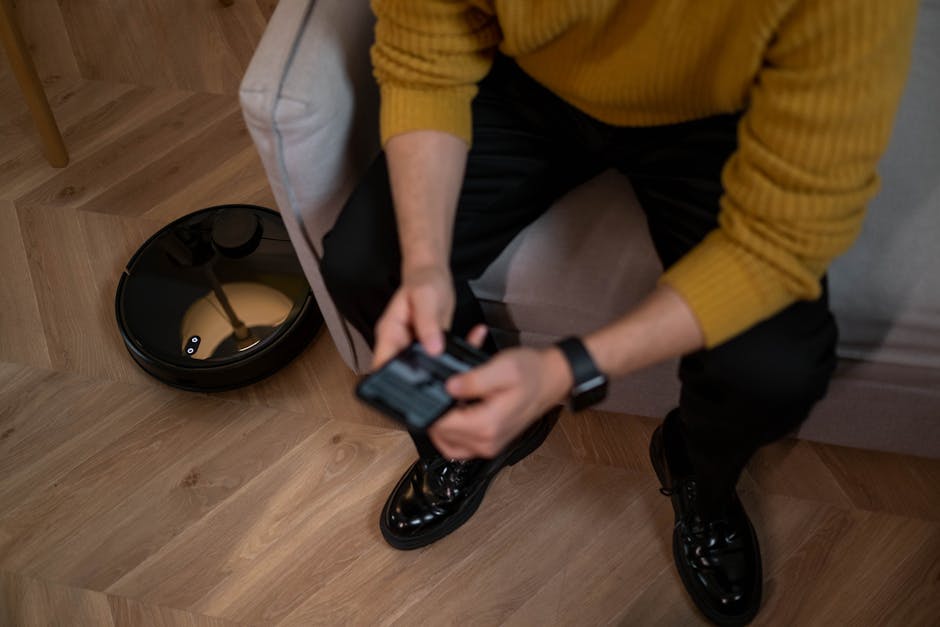
Hello I am Paritosh a PhD student at Clemson
2
0:00:07.080,0:00:12.841
3
and framing reduce deliberation in smart home
4
privacy decision making
5
This research is a collaborative effort between
research groups at Clemson University USA and Eindhoven University of Technology
7
0:00:23.830,0:00:27.150
8
0:00:27.150,0:00:31.499
9
depend on various contextual factors such
10
as which devices collect data which devices
receive that data and how all the data gets stored. Ideally we want privacy decision of smart
13
0:00:41.870,0:00:47.250
14
to be true Additionally –> we also observed
15
that the effect of contextual factors on privacy
decisions is mediated by attitudes These attitudes are cognitive appraisals towards contextual
17
0:00:56.510,0:01:00.929
18
to be free from heuristics such as default
19
and framing, This however is not the case
We show that defaults and framing not only have a direct effect on privacy decisions
21
0:01:11.479,0:01:14.000
22
0:01:14.000,0:01:19.380
23
a web based controlled experiment involving1132
24
US based participants recruited via Amzon
M-Turk. Each participant was presented with 13 scenarios Each scenario Including one on this slide
27
0:01:31.850,0:01:38.030
28
4608 scenarios this way
29
This is how our participants saw the experimental
conditions They read the scenario and answered two types of question First was whether they
31
0:01:47.240,0:01:51.420
32
questions which were about their attitudes
33
towards these scenarios such as comfort appropriateness
and risk.
The defaults and framing were manipulated
35
0:02:00.630,0:02:05.700
36
manipulated as – enable by default disable
37
by default and no default
38
Framing was manipulated as positive negative
and neutral While analyzing the data we created generalized linear
40
0:02:17.780,0:02:22.660
41
and framing do have a main effect on privacy
42
decisions We did not find interaction effects
between defaults and framing. However, we did find two-way interaction effects
44
0:02:32.390,0:02:37.960
45
the regression estimates of the effect of
46
attitudes on privacy decisions
47
If you look at the left plot –> you will notice
that the regression estimates of attitudes are consistently higher in absence of defaults More interestingly in case of framing i.e
50
0:02:51.920,0:02:57.370
51
is higher in case of positive framing as opposed
52
to neutral framing This goes on to show
that in certain cases the framing can even reverse the effect of attitudes.
Lets look at logistic regression plots ideally
55
0:03:11.200,0:03:15.870
56
compared to no default in presence negative
57
attitudes, That is the negative default should
support people to disable a scenario when their attitude towards the scenario is negative
59
0:03:25.690,0:03:32.120
60
is reversed In case of comfort the disable
61
default has almost similar effect as no defaults
for participants with negative attitude towards scenario whereas the enable default pushes
63
0:03:44.260,0:03:46.450
64
0:03:46.450,0:03:51.730
65
between framing collection concerns attitudes
66
you can find more details about these interesting
results in our paper.

Based on results we conclude that nudges can
68
0:04:00.780,0:04:05.150
69
effects where the effect of cognitive appraisal
70
on decisions is reduced in presence of defaults
pointing to the possibility that the defaults and framing reduce deliberation towards context. As for future designs of smart home privacy
73
0:04:18.780,0:04:26.630
74
decisions in really short time while also
75
ensuring optimal decision quality,
76
One potential solution is the use of user
tailored defaults.
We discuss these in another research paper and we welcome you to look
78
0:04:37.440,0:04:41.430
79
to reach out in case of any questions! Thank
80
you for listening!.
As an Amazon Associate I earn from qualifying purchases.







